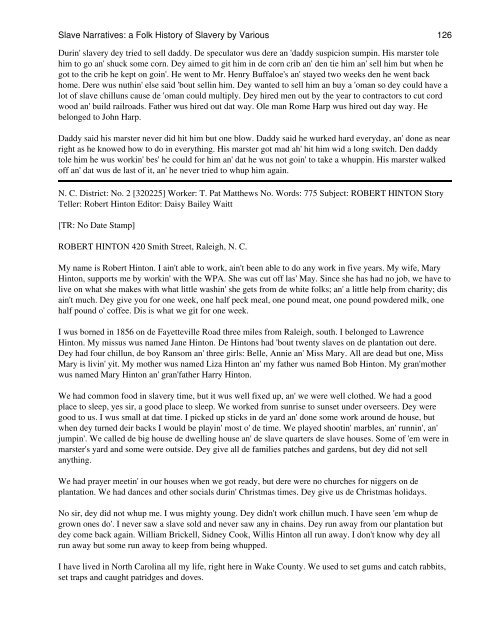Slave Narratives: a Folk History of Slavery in the United States
Slave Narratives: a Folk History of Slavery in the United States
Slave Narratives: a Folk History of Slavery in the United States
You also want an ePaper? Increase the reach of your titles
YUMPU automatically turns print PDFs into web optimized ePapers that Google loves.
<strong>Slave</strong> <strong>Narratives</strong>: a <strong>Folk</strong> <strong>History</strong> <strong>of</strong> <strong>Slave</strong>ry by Various 126Dur<strong>in</strong>' slavery dey tried to sell daddy. De speculator wus dere an 'daddy suspicion sump<strong>in</strong>. His marster tolehim to go an' shuck some corn. Dey aimed to git him <strong>in</strong> de corn crib an' den tie him an' sell him but when hegot to <strong>the</strong> crib he kept on go<strong>in</strong>'. He went to Mr. Henry Buffaloe's an' stayed two weeks den he went backhome. Dere wus nuth<strong>in</strong>' else said 'bout sell<strong>in</strong> him. Dey wanted to sell him an buy a 'oman so dey could have alot <strong>of</strong> slave chilluns cause de 'oman could multiply. Dey hired men out by <strong>the</strong> year to contractors to cut cordwood an' build railroads. Fa<strong>the</strong>r wus hired out dat way. Ole man Rome Harp wus hired out day way. Hebelonged to John Harp.Daddy said his marster never did hit him but one blow. Daddy said he wurked hard everyday, an' done as nearright as he knowed how to do <strong>in</strong> everyth<strong>in</strong>g. His marster got mad ah' hit him wid a long switch. Den daddytole him he wus work<strong>in</strong>' bes' he could for him an' dat he wus not go<strong>in</strong>' to take a whupp<strong>in</strong>. His marster walked<strong>of</strong>f an' dat wus de last <strong>of</strong> it, an' he never tried to whup him aga<strong>in</strong>.N. C. District: No. 2 [320225] Worker: T. Pat Mat<strong>the</strong>ws No. Words: 775 Subject: ROBERT HINTON StoryTeller: Robert H<strong>in</strong>ton Editor: Daisy Bailey Waitt[TR: No Date Stamp]ROBERT HINTON 420 Smith Street, Raleigh, N. C.My name is Robert H<strong>in</strong>ton. I a<strong>in</strong>'t able to work, a<strong>in</strong>'t been able to do any work <strong>in</strong> five years. My wife, MaryH<strong>in</strong>ton, supports me by work<strong>in</strong>' with <strong>the</strong> WPA. She was cut <strong>of</strong>f las' May. S<strong>in</strong>ce she has had no job, we have tolive on what she makes with what little wash<strong>in</strong>' she gets from de white folks; an' a little help from charity; disa<strong>in</strong>'t much. Dey give you for one week, one half peck meal, one pound meat, one pound powdered milk, onehalf pound o' c<strong>of</strong>fee. Dis is what we git for one week.I wus borned <strong>in</strong> 1856 on de Fayetteville Road three miles from Raleigh, south. I belonged to LawrenceH<strong>in</strong>ton. My missus wus named Jane H<strong>in</strong>ton. De H<strong>in</strong>tons had 'bout twenty slaves on de plantation out dere.Dey had four chillun, de boy Ransom an' three girls: Belle, Annie an' Miss Mary. All are dead but one, MissMary is liv<strong>in</strong>' yit. My mo<strong>the</strong>r wus named Liza H<strong>in</strong>ton an' my fa<strong>the</strong>r wus named Bob H<strong>in</strong>ton. My gran'mo<strong>the</strong>rwus named Mary H<strong>in</strong>ton an' gran'fa<strong>the</strong>r Harry H<strong>in</strong>ton.We had common food <strong>in</strong> slavery time, but it wus well fixed up, an' we were well clo<strong>the</strong>d. We had a goodplace to sleep, yes sir, a good place to sleep. We worked from sunrise to sunset under overseers. Dey weregood to us. I wus small at dat time. I picked up sticks <strong>in</strong> de yard an' done some work around de house, butwhen dey turned deir backs I would be play<strong>in</strong>' most o' de time. We played shoot<strong>in</strong>' marbles, an' runn<strong>in</strong>', an'jump<strong>in</strong>'. We called de big house de dwell<strong>in</strong>g house an' de slave quarters de slave houses. Some <strong>of</strong> 'em were <strong>in</strong>marster's yard and some were outside. Dey give all de families patches and gardens, but dey did not sellanyth<strong>in</strong>g.We had prayer meet<strong>in</strong>' <strong>in</strong> our houses when we got ready, but dere were no churches for niggers on deplantation. We had dances and o<strong>the</strong>r socials dur<strong>in</strong>' Christmas times. Dey give us de Christmas holidays.No sir, dey did not whup me. I wus mighty young. Dey didn't work chillun much. I have seen 'em whup degrown ones do'. I never saw a slave sold and never saw any <strong>in</strong> cha<strong>in</strong>s. Dey run away from our plantation butdey come back aga<strong>in</strong>. William Brickell, Sidney Cook, Willis H<strong>in</strong>ton all run away. I don't know why dey allrun away but some run away to keep from be<strong>in</strong>g whupped.I have lived <strong>in</strong> North Carol<strong>in</strong>a all my life, right here <strong>in</strong> Wake County. We used to set gums and catch rabbits,set traps and caught patridges and doves.
















